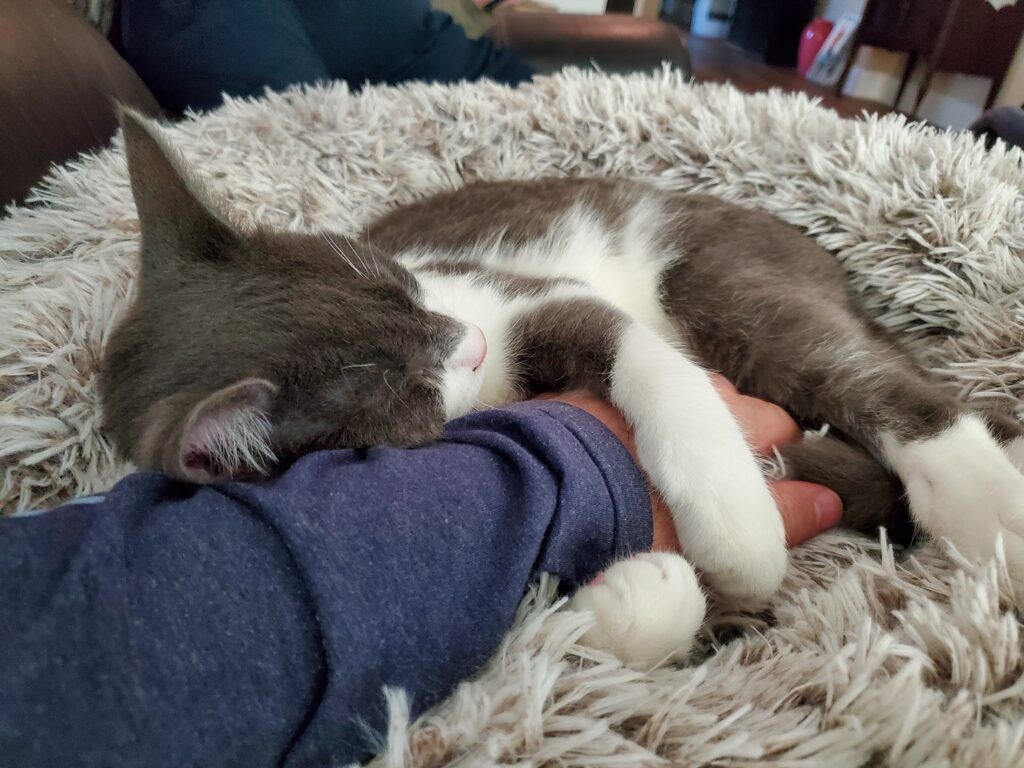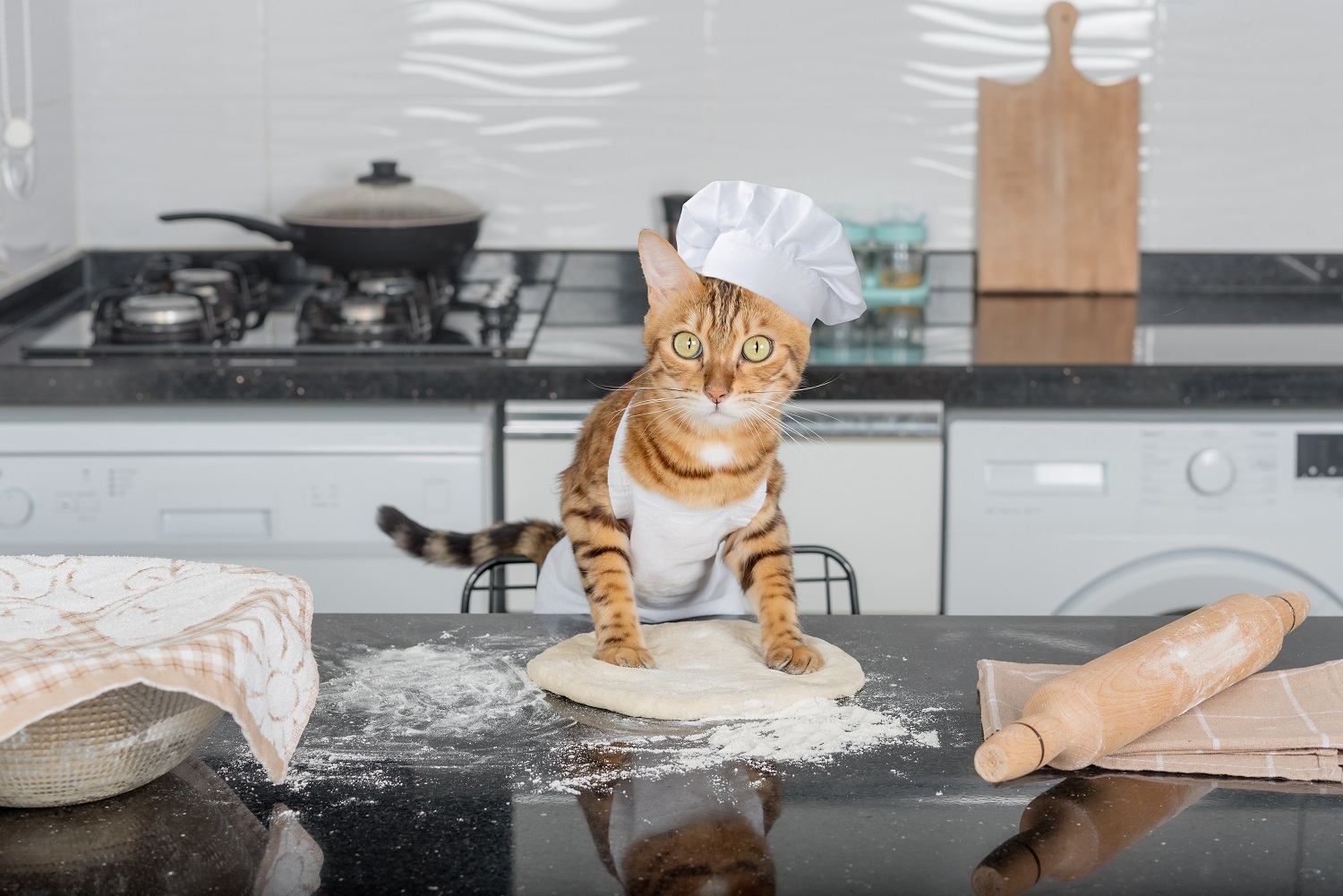Kittens do a lot of strange things. They zoom around the house at 2 a.m., attack shadows, and occasionally stare at nothing like they are seeing ghosts. But one of the most oddly adorable behaviors is kneading, those rhythmic paw-pushing motions that look like they are making invisible biscuits.
If your kitten regularly climbs into your lap and begins pressing their paws into your legs, chest, or stomach, you might be wondering what they are doing and why it always seems to happen right when you get comfortable. Here is what kneading means, where it comes from, and whether you should encourage or redirect the behavior.
What Is Kneading?
Kneading is a repetitive motion where kittens press their front paws into a soft surface, alternating left and right. It often happens when they are very relaxed, sleepy, or feeling affectionate. Some kittens also purr or drool while kneading. Others dig in with claws like they are trying to make a sourdough starter out of your thigh.
This behavior is completely normal and usually a sign that your kitten is content, comfortable, or bonding with you.
Why Do Kittens Knead?
Kneading starts very early in life and serves several purposes. While the behavior may seem random, it is actually tied to instinct, emotion, and comfort.
1. It Begins at Birth
Kittens begin kneading as newborns while nursing from their mother. The motion helps stimulate milk flow and creates a sense of security. Even after they are weaned, many kittens continue the habit because it is deeply tied to feelings of warmth, nourishment, and comfort.
Think of it like a feline security blanket, only with more claws and less cotton.
2. It Is a Comforting Habit
Most kittens knead when they feel especially safe and relaxed. You might notice kneading when your kitten is:
- Settling down for a nap
- Cuddled in a warm lap
- Purring softly
- Nestled into a favorite blanket or bed
This is their way of saying, I trust you, I feel safe, and I am about to take the best nap of my life.
3. It Marks Territory
Cats have scent glands in their paw pads, and kneading helps them leave a subtle scent on whatever they are pressing into. This behavior is one way cats claim their favorite spaces or people. So when your kitten kneads your hoodie, they are basically saying, This belongs to me now. You may leave it on the floor, human.
4. It Is Leftover Nesting Instinct
In the wild, cats will often knead grass, leaves, or bedding to create a soft spot for sleeping. Your kitten might knead a blanket or cushion before lying down because that nesting behavior is still built in, even if they have never seen a patch of grass in their life.
Is Kneading a Problem?
For the most part, kneading is harmless and cute. But there are a few things to keep in mind.
- If your kitten uses claws while kneading, it can be painful
- If they knead on furniture or bedding, it could cause snags or small tears
- Some cats knead excessively when they are anxious, especially if paired with drooling or chewing
If your kitten is a little too enthusiastic with their biscuit-making, you do not have to stop the behavior entirely. You can gently redirect it with a soft blanket, towel, or cushion. Or trim their claws regularly to reduce the ouch factor.
Never punish your kitten for kneading. It is a positive, self-soothing behavior, not something they are doing to annoy you.

I know my humans think it’s cute when I make biscuits but it’s really not for them. They don’t get that it means that I OWN THEM. Then they reward me with tasty treats. Okay, the cuddling’s nice too. #SillyHumans #HappinessIsMakingBiscuits #KneadingForTreats
Joey
What If Your Kitten Kneads and Bites or Suckles?
Some kittens combine kneading with gentle biting or suckling on fabric, especially when they are very relaxed. This is usually tied to early weaning or a strong need for comfort. It is not harmful, but it can become a habit if they do it often.
To manage it:
- Provide cozy, chew-safe blankets or plush toys
- Offer extra playtime and interaction during the day
- Talk to your vet if it becomes obsessive or affects eating habits
In most cases, it is just another quirky kitten behavior that fades with age.
Final Thoughts: Let the Biscuits Bake
Kneading may look strange, but it is one of the clearest signs that your kitten feels safe, happy, and emotionally connected to you. Whether they are kneading a pillow, your sweatshirt, or your bare arm, it is their way of expressing affection and comfort.
If your kitten likes to make biscuits on you, take it as a compliment. You are officially part of the inner circle.
Just maybe keep a blanket nearby for your lap. Your legs will thank you.
Sources:
– Why Do Cats Knead? https://www.petmd.com/cat/behavior/why-do-cats-knead
– Understanding Feline Kneading https://www.icatcare.org/advice/why-do-cats-knead
– Cat Behavior and Bonding https://www.aspca.org/pet-care/cat-care/common-cat-behavior-issues
– Kneading and Comfort Behavior in Cats https://vcahospitals.com/know-your-pet/understanding-feline-behavior-kneading
– Kitten Development and Soothing Habits https://www.humanesociety.org/resources/kitten-development-timeline
Recent Posts
Your Cat Might Be a Furry Little Healer… or at Least a Fuzzy Alarm System If you’ve ever had your cat suddenly become extra clingy when you’re under the weather, you’re not alone. From...
Cats are experts at hiding things, socks under furniture, their disdain for your playlist, and, unfortunately, symptoms of illness. In the wild, showing weakness could make them a target, so even...


